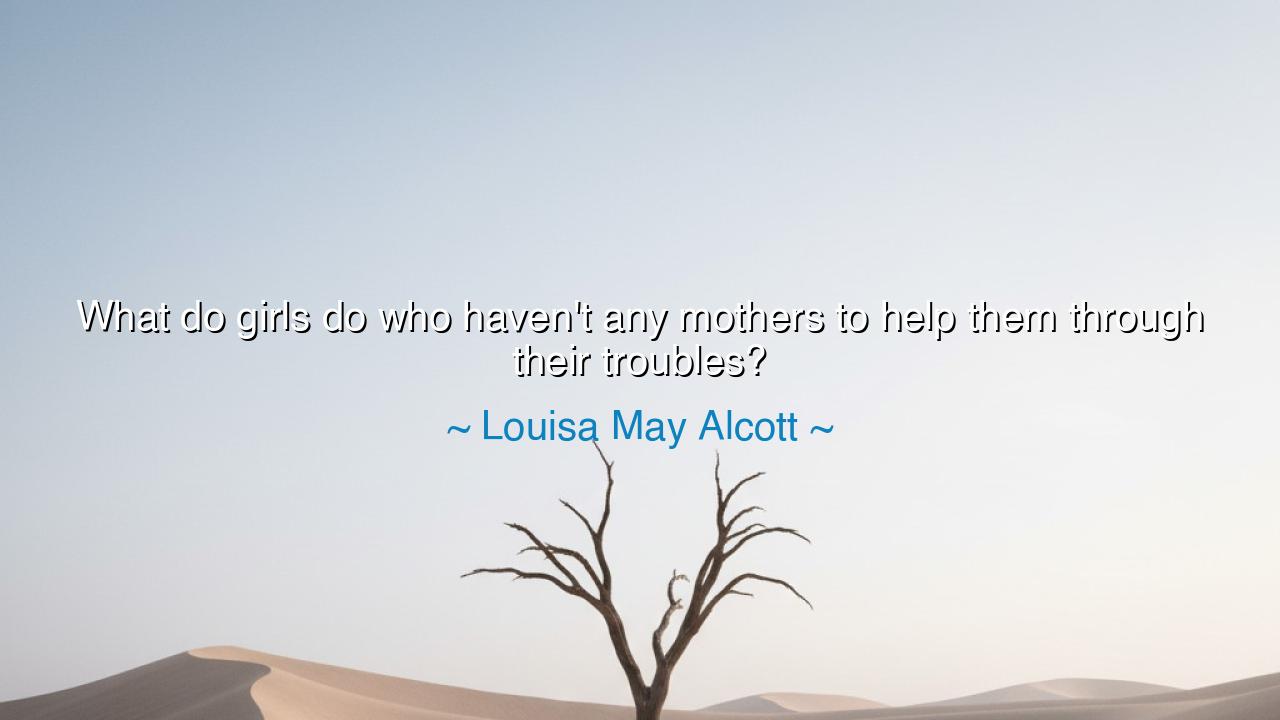
What do girls do who haven't any mothers to help them through






Hearken, O seekers of truth, to the tender and sorrowful question of Louisa May Alcott: “What do girls do who haven’t any mothers to help them through their troubles?” Beneath this quiet wondering lies an ocean of human longing — a recognition that the mother’s presence, her counsel, her gentleness, her steadying hand, is a pillar upon which many young hearts rest. Alcott, who herself lived through hardship and bore the weight of responsibility from an early age, understood that the mother’s love is not merely a comfort but a compass — a force that guides through confusion, fear, and the storms of youth.
In the ancient days, the bond between mother and child was revered as sacred — the very mirror of life itself. To lose that bond, or to grow without it, was seen as a test of spirit and resilience. The mother’s wisdom is not found in instruction alone but in presence — in the silent assurance that one is loved, seen, and understood. When Alcott asks her question, she is not only expressing pity for the motherless; she is marveling at their strength, wondering how they bear the burden of life’s lessons without that quiet sanctuary of maternal guidance.
Consider the life of Eleanor Roosevelt, who lost both her parents before she turned ten. In her grief, she withdrew into silence, yet from that silence was born a soul of immense compassion and fortitude. She became a voice for the voiceless, a guiding light for a generation wounded by war and injustice. Deprived of her mother’s warmth, she learned to become that presence for others — to mother the world. In her journey we see the echo of Alcott’s question answered: those who grow without a mother must learn to cultivate her spirit within themselves, to draw from the memory of tenderness they may never have known.
Alcott’s question, too, reveals the timeless truth that motherhood is not bound by blood alone. Many who are motherless find their way through the love of others — a sister, a teacher, a friend, a grandmother — for in every soul that nurtures, that listens, that believes in another’s worth, the essence of the mother lives again. The ancient Greeks honored Demeter, the earth-mother, who wept for her lost daughter; yet her grief gave birth to spring itself. Thus, the mother’s spirit, once awakened, never truly dies — it manifests through generations, through acts of kindness, through the endless cycle of care and creation.
And yet, Alcott’s words also remind us of our duty to compassion. For every girl who walks alone through the trials of life without a mother’s voice to comfort her, there must be those who extend understanding and strength. Society, in its wisdom, must act as the great mother — offering guidance, education, and love to the orphaned in body or in spirit. To ignore their plight is to betray the essence of our shared humanity.
From this reflection rises a clear lesson: nurture those around you, for every soul you comfort becomes a continuation of the mother’s sacred work. Tenderness, patience, and listening — these are the virtues that sustain the motherless and strengthen the weary. When you offer warmth to another’s wounded heart, you become a vessel of the same eternal force that Alcott mourned and revered.
And so, let the teaching be remembered: a mother’s love is both mortal and eternal. Though she may be absent in body, her spirit survives in the hearts of those who give care, who offer counsel, who protect and uplift. Those who lack her guidance are not forsaken — for in the vast network of human kindness, the mother’s voice still whispers, her strength still flows, her compassion still lives. Let us all, then, strive to be that voice for another, so that no soul need face their troubles alone.






AAdministratorAdministrator
Welcome, honored guests. Please leave a comment, we will respond soon